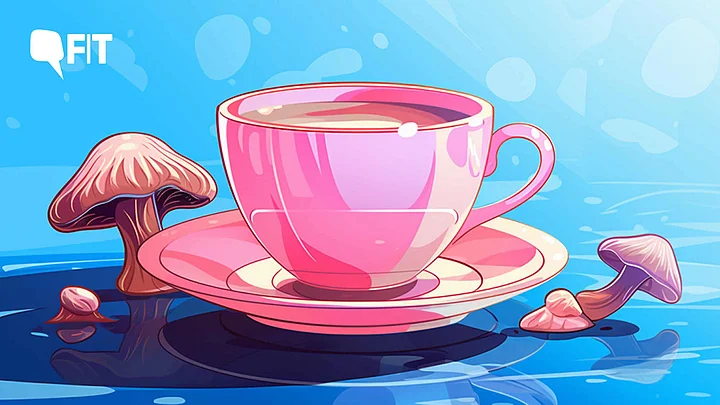Mushroom coffee is the latest 'superfood' to catch the internet's fancy.
If you've been doomscrolling on social media lately, you've likely seen advertisements for them, and have likely been intrigued by them too.
Like all trendy foods, shroom coffee—coffee blended with edible mushrooms—is touted to be an 'elixir' that has a slew of health benefits, from helping you focus and reducing stress to being anti-inflammatory and promoting gut health.
So, can elevating your morning coffee with powdered mushrooms really help you fight off the Monday blues, make you more productive, and help you meet your New Year's resolution of being healthier?
Mushroom coffee is essentially a beverage mix containing a specific type of ground medicinal mushroom (the most popular one being lion’s mane ) along with ground coffee beans, and sometimes other ingredients too, like ashwagandha, coconut oil and so forth.
It should be noted that the mushrooms used in these blends do not have any psychoactive properties.
'Tall Claims, But They Don't Make Sense'
According to the packaging of several different shroom coffee products sold in India, they're supposed to:
Help you focus
Boosts brain function, and make you more productive
Balance stress hormones
Boost immunity
Promote a healthy gut microbiome
Experts FIT spoke to say that the claims made on these products seem too tall to be true.
"These are vague claims with no scientific backing," says hepatologist Dr Cyriac Abby Phillip, known online as The Liver Doc.
"It's like one of those snake oils for hair growth. I'm not very convinced," says Dr Shikha Sharma, Nutritionist and Founder of Nutriwel Health, an Online Nutrition Advisory Company of Nutrition Coaches.
For one, she says, "Gut health is a very complex ecosystem that cannot be fixed with one ingredient."
As for the other claims, she says, "It looks like they've taken claims of health benefits linked to each component in the mix and slapped it on the label. The combination sounds illogical to me."
"So you have coffee, which is a stimulant, and tea extracts, which are also stimulants; both of them are said to have antioxidant properties; then there is ashwagandha, which has calming properties for stress, but they would end up cancelling each other out," she elaborates.
"Its like a masala movie with all selling components like action and romance and comedy, but lacks a plot. It's a frivolous product."Dr Shikha Sharma, Founder-Nutriwel Health
Where does the mushroom feature in this film? Think of a lead role with no dialogue.
Yes, Mushroom Can be Good for You, but It’s Not a Magic Bullet
Speaking to FIT, Dr Sharma says, "Just putting mushrooms in your coffee isn't going to help anyone get healthier, just as eating some mushrooms with coffee wouldn't."
While some varieties of edible mushrooms do contain nutrients like vitamin D, vitamin B6, potassium, and folate and are good food sources to incorporate into a balanced diet, experts say they don't have any specific health benefits.
"There is no magic formula in mushrooms to treat any health issue."Dr Shikha Sharma, Founder-Nutriwel Health
While dried mushrooms and mushroom extracts have been used in traditional Chinese medicine for centuries, there still isn't strong scientific evidence to support the effectiveness of these preparations in the treatment of human disease.
‘Anti-Inflammatory’, ’Anti-Oxidant' and Other Buzz Words
Certain specific terms like 'anti-inflammatory', 'anti oxidant', and 'Immunity boosting' are often used to sell supplements and 'wellness' products, says Dr Abby Phillip.
What does anti-inflammatory even mean? Dr Abby Philips says, "A regular cup of coffee or tea has anti-inflammatory properties. Even your body has both anti-inflammatory and pro-inflammatory molecules."
"Every plant, every spice in the kitchen has some anti-inflammatory component to it, but that doesn't mean that they will help reduce inflammation in the body when consumed,"Dr Cyriac Abby Philips
Although these claims are often used to sell products, they're rarely backed with scientific evidence. This is also the case with mushroom coffee sold in the market.
There are next to no large-scale clinical studies providing evidence to back any of these claims linked to shroom coffees.
"The only 'evidence' is a study published in January 2023 but it was conducted in mice. There's no evidence in humans," says Dr Abby Philips.
There is also no scientific study to determine how much of it is safe to consume and what the long-term adverse effects associated with these products can be.
At the end of the day, says Dr Sharma, coffee is a stimulant, and it will sell, irrespective of whether the other components of the blend have any discernible health benefits or not.

